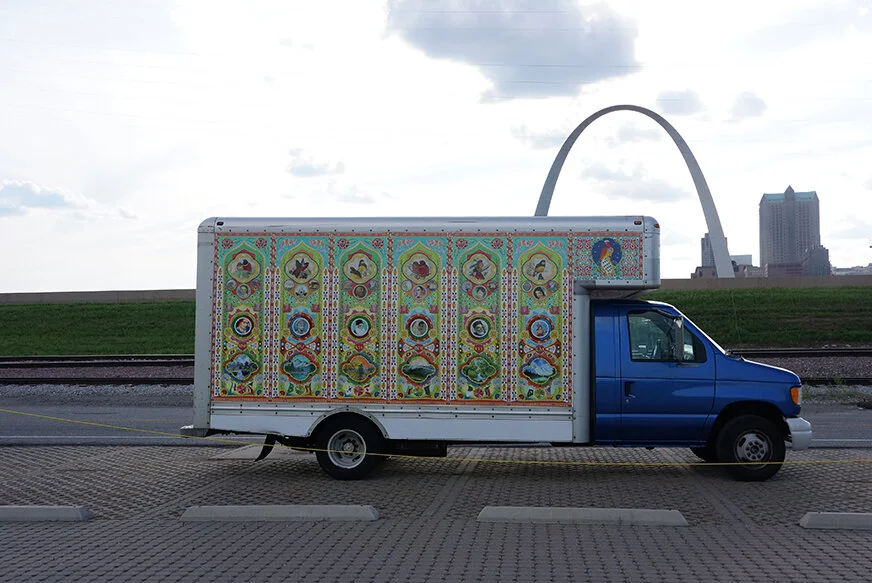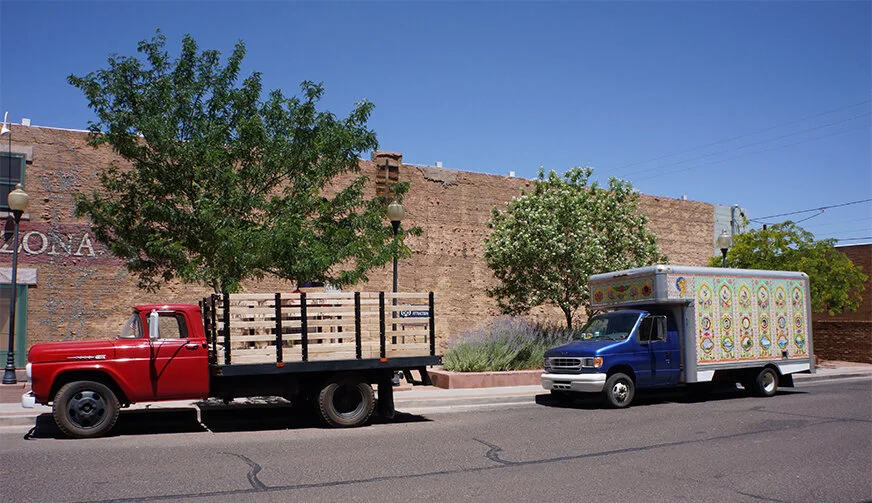
Indus Truck Works Ltd. / Indus Truck Decor Corp.
2013-Present
“The theoretical recognition of the split-space of enunciation may open the way to conceptualizing an international culture, based not on the exoticism of multiculturalism or the diversity of cultures, but on the inscription and articulation of culture’s hybridity. It is the in-between space that carries the burden of the meaning of culture, and by exploring this Third Space, we may elude the politics of polarity and emerge as the others of our selves.”
― Homi K. Bhabha, The Location of Culture
Initiated by a research trip funded by Art Matters to Pakistan in 2011, the project revolves around reflections on and projections of hyphenated Pakistani identity. Arguably Pakistan is the quintessential post modern third world nation, divorced from its own history by partition, teetering on political and economic collapse, battered by cold war politics, a pariah nation to some and a septic playground to others. The nation birthed into potential possibilities is now clinging for a reason to be, at odds in constructing its own identity (reject the West, rejoice the West, adopt the imagined East), and filled with a people in desperate need to find something to be proud of. And to this, the hyphenated Pakistani finds only thorny entanglement, where one exists in a perpetual contradictory state. As such the project is an exploration of Bhaba’s notion of Third Space, where possible reconciliation of conflicting ideologies and identities may find respite through strategies of hybridity.
The Pakistani Transport Truck (along with buses and other privately owned transportation vehicle) holds a particular and substantial place in Pakistan’s visual landscape and cultural identity. “The Pakistani Truck is a cultural vehicle... it carries in it and on it an array of cultural messages and expectations”. (Jamal
J. Elias, On Wings of Diesel, Trucks, Identity and Culture in Pakistan.)These riotous hyper- graphical trucks are imaged and messaged with the hopes, beliefs, aspirations and cultural reflections of not only the truck owners and truck painters but by proxy of Pakistani society as a whole.
These trucks, historically Bedford Rockets and more recently Korean imports are a uniquely Pakistani product (and not a shared tradition with India) and for that matter a fairly modern creation having primarily developed after the 1947 partition. As the vernacular form has developed, so to have regional styles emerged, Punjabi, Rawalpindi, Peshawari, Balochi and Swati styles, showcase a flexible medium that accommodates national and regional, societal and individual expressions.
The project reinterprets the vernacular iconography and methodology found on the Pakistan truck onto typically barren American Box truck (sometimes adorned with corporate logos but usually just left blank) in order to reclaim a lost cultural heritage for the diasporic population but also to develop a hybrid style (hyphenated Pakistani) that projects the hopes and aspirations of Pakistani immigrant populations in the US. A major difference in developing the hybrid style will be the shift in using vinyl graphics (the medium of choice for American Truck decals) instead of the paint, tin and reflective tape typically used on the trucks in Pakistan.
In transferring the familiar iconography of one culture (the colorful and exquisite patterns and design of Pakistani Trucks) on to another (the arguable blander American cousin), the project also proposes to address the lopsided expanse of globalization, where Western, in particular American cultural hegemony dominates the global landscape. With many nations still struggling to establish their own national identities (especially in the aftermaths of post colonial and post cold war politics) nations are finding their cultural identity framed within the dominant western lens, and as such often seen as exotic and in alterity. The modality of the project’s gesture, the placing of unfamiliar iconography onto US trucks, asserts to introduce these images into the everyday, allowing them to become just another part of the saturated visual landscape as the trucks crisscross the nation, and thus subversively insert aspects of this “other” into the American vernacular.
As such the gesture also addresses ideas of cultural loss to minority immigrant communities (in this case Pakistani-American, whereas the decorated trucks, a ubiquitous site in Pakistan is lost to its migrated communities), who must negotiate what cultural heritages they need to preserve and what aspects they must let go within their new, albeit foreign, homeland.
Two subsequent and ongoing services have been created, a truck decorating company offering similar conversions for client trucks (Indus Truck Décor Corporation), as well as the availability of the current truck to be rented for any transport need (Indus Truck Works Ltd.)
The Indus Truck Works hybrid truck performs in various modes: Transport, where the
truck is to be used as a rental moving vehicle, Cinema, where a rear projection screen is set up to broadcast movies (of the artist making
or choosing) that are simultaneously broadcast over the radio transmitter; Performance, where the interior of the truck is transformed into a performance stage, with lights and fog machine and becomes a performance space for bands
or others to perform; Food, where a portable tandoor is setup to distribute Kabob rolls and a traditional Chai (tea) is served.




